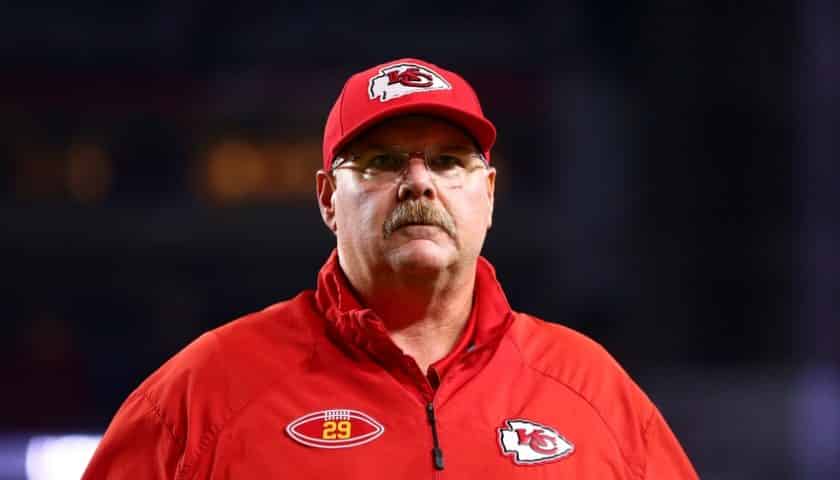In a surprising turn of events that resonated across the sports world, Kansas City Chiefs’ Head Coach Andy Reid made headlines last week by releasing three of his top players from the team for kneeling during the national anthem. This decision, encapsulated in Reid’s firm declaration “Not on my field,” has sparked a heated debate, shedding light on the ongoing intersection of sports, politics, and personal beliefs.
Known for his straightforward coaching style and deep reverence for football, Andy Reid’s stance is seen by many as a reflection of his unwavering principles. The three players, who knelt as a peaceful protest against social injustices, have become central figures in a controversy that raises questions about the balance between freedom of expression and respect for national symbols.
The incident occurred on a clear Sunday afternoon, just moments before the Chiefs were scheduled to play their rivals. As the national anthem began to play, the three players knelt with bowed heads, a gesture synonymous with the protest against racial inequality and police brutality. The stadium, filled with fans eagerly anticipating the game, fell silent as the players’ protest unfolded, casting a shadow over the event.
Coach Reid, standing resolutely on the sidelines, observed the scene with a mix of disappointment and determination. Known for his commitment to team unity and respect for the flag, Reid’s decision was swift. As the anthem ended, he approached the players and made his decision clear. “Not on my field,” he stated firmly, indicating their immediate removal from the team.
The fallout from Reid’s decision was swift and far-reaching. Fans and pundits took to social media and the airwaves to express their views, creating a divide between those who supported Reid’s actions and those who criticized them. Supporters applauded Reid for upholding what they see as fundamental values of patriotism and respect, while critics viewed the move as a violation of the players’ right to free speech, especially in the context of professional sports, which has become a platform for social commentary.
The debate extends beyond the confines of the Chiefs’ stadium and touches on broader societal issues. Kneeling during the anthem, popularized by former NFL quarterback Colin Kaepernick in 2016, has sparked a national conversation about race, privilege, and patriotism. Reid’s decision to dismiss the players thrusts this conversation into the spotlight once again, forcing fans, players, and officials to confront where they stand on these complex issues.
Legal experts and civil rights advocates have weighed in on the potential implications of Reid’s actions, questioning the balance between an employer’s authority and an individual’s right to express personal beliefs. The NFL, caught in the middle, faces pressure to clarify its position on player conduct and political expression, an issue that has plagued the league for years.
As the controversy swirls, the three players find themselves at a crossroads. Their protest, intended to raise awareness of systemic injustices, has instead embroiled them in a contentious debate about loyalty, respect, and the role of athletes in society. While their future in professional football remains uncertain, their actions have sparked a conversation that transcends the world of sports.
As the dust settles, this incident serves as a poignant reminder of the complex relationship between sports, politics, and society. Reid’s decision, whether seen as a defense of patriotic values or a suppression of dissent, underscores the ongoing struggle to navigate these turbulent waters. The debate over the right to protest, the meaning of patriotism, and the role of athletes as social activists continues to unfold, challenging individuals to examine their own values and beliefs in the face of a rapidly changing social landscape.
In conclusion, “Not on my field” is more than just a statement from a football coach; it is a catalyst for a broader conversation about freedom, responsibility, and the power of sports as a platform for social change. As America grapples with these issues, the actions of Coach Reid and his players serve as a reminder of the enduring importance of dialogue, understanding, and respect for diverse perspectives in the pursuit of a fairer and more just society.

